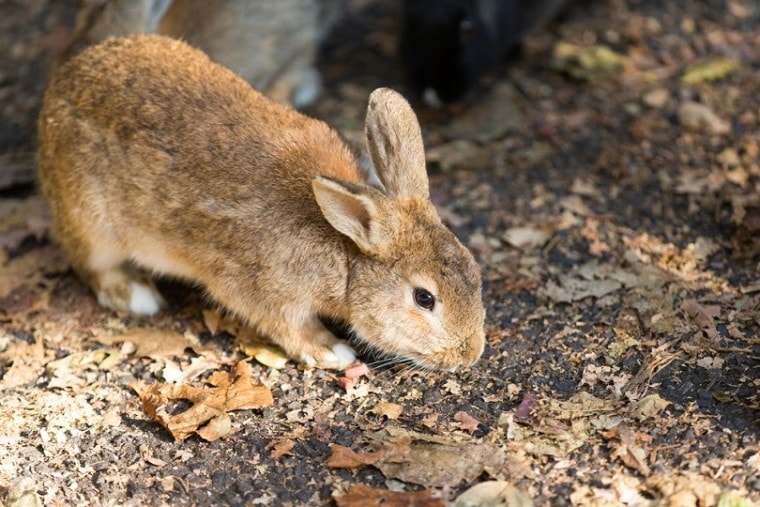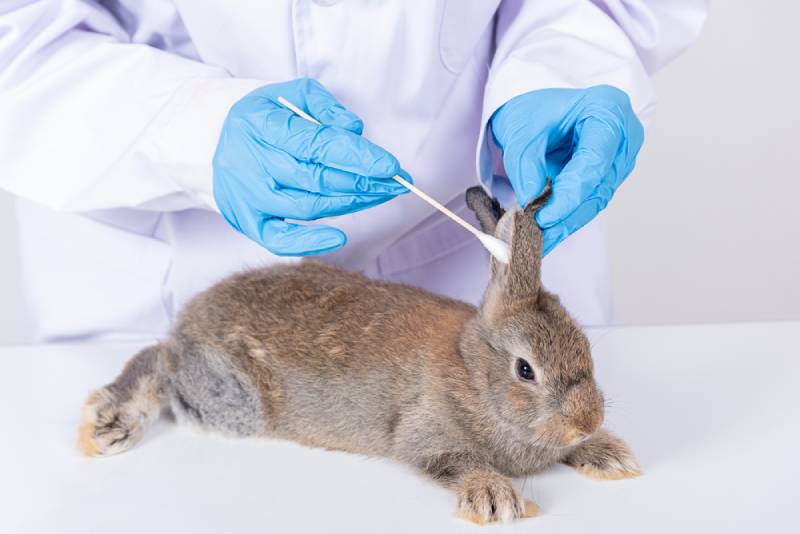
Click to Skip Ahead
When you hear “failed science experiment,” you probably think of radiation disasters and science fiction stories, not bunnies. But luckily, this failed experiment turned out too cuddly and friendly—we’d call that a success! The Swiss Fox rabbit was bred in the 1920s in an attempt to find a cheaper alternative to Arctic fox fur.
Luckily for the rabbits, their fur wasn’t like fox fur at all—it was much too long, wispy, and delicate. Even more surprising, these rabbits had friendly, docile personalities that won their breeders’ hearts. The fur farming project was scrapped, and these cuddly bunnies made the jump to becoming house pets.
Breed Overview
Size:
Medium
Weight:
5.5–7.5 lbs
Lifespan:
5–8 years
Similar Breeds:
Angora, Havana, Silver Fox
Suitable for:
First-time owners, older children, seniors, apartment living, indoor rabbit enclosures
Temperament:
Calm, friendly, intelligent
The Swiss Fox rabbit may not have a fox’s fur, but it does have a beautiful coat. Its fur is long and fine and comes in all shades of silvery gray. But its personality is even more incredible. These rabbits are cuddly teddy bears that love to sit on their owners’ laps, get along well with older children, and often have a deep love for those around them. The breed is almost unheard of in the United States, but it’s much more common in Europe, where it spread from Switzerland in the years after World War II. There’s a lot to love about this unique breed.
Swiss Fox Rabbit Breed Characteristics
How Much Do These Rabbits Cost?
Swiss Fox rabbits are very rare in the United States, which makes it hard to put a price point on them. Because they’re rare and beautiful, you’ll probably see them being sold for at least $65, while some breeders might price them as high as $80–$100, depending on the area and breeder. In general, purchasing a rabbit from the breeder will result in happier, healthier, and friendlier rabbits than purchasing from a pet store—and you’re not likely to find a pet store that carries this rare breed anyway.
Temperament & Intelligence of the Swiss Fox Rabbit
Do These Rabbits Make Good Pets? 👪
Swiss Fox rabbits make good pets for most situations. They are known for their sweet, loving disposition. They’re cuddly, placid rabbits that are more likely to sit on your lap than play with you and then tend to be comfortable with being handled and enjoy getting brushed. They’re also intelligent rabbits that can learn quickly and be trained to do tricks or use a litter box. They can adapt to a variety of home situations—they can make good pets for families or singles, and they can tolerate apartment living well.
Does This Rabbit Get Along with Other Pets?
Swiss Fox rabbits get along well with other rabbits, provided they are introduced carefully. Some rabbits do better at sharing living space than others. Swiss fox rabbits are generally stressed by being around predator animals such as cats or dogs—if your house has cats or dogs, it’s best to make sure that they can’t access your rabbit’s space and closely supervise any interactions.
 Things to Know When Owning a Swiss Fox Rabbit:
Things to Know When Owning a Swiss Fox Rabbit:
Food & Diet Requirements 🥕
Most rabbits have similar dietary requirements. Since Swiss Fox rabbits are medium-sized, they will eat a moderate amount of food. You’ll need to give your rabbit continuous access to clean hay and water. If your rabbit goes too long without eating hay, they can have digestive issues such as GI stasis. Along with hay, a mixture of fruits, vegetables, and rabbit pellets can help them gain any nutrients that they might be missing.
Habitat & Hutch Requirements 🏠
Swiss Fox rabbits are less hardy than some breeds, so they thrive best when they’re kept indoors. However, some owners have successfully kept this breed in an outdoor hutch, especially in moderate weather. They should have a spacious hutch or cage to call home—it should be at least 30” on each side and 24” high. This will ensure that they have room to jump and turn around.
You should make sure that your rabbit’s hutch is kept insulated to stay between about 55 degrees and 75 degrees. It should give your rabbit access to clean hay, water, and bedding.
Exercise & Sleeping Needs 🐇
Aside from their cage or hutch space, your rabbit should also spend time outside the hutch every day in a large playpen, a rabbit-safe room, or an outdoor enclosure. This helps them exercise and remain happy and healthy. You’ll also want to interact with your rabbit regularly to help it remain socialized.
Inside your rabbit’s cage, you should have a thick layer of straw, wood shavings, or other bedding that is changed out regularly as it gets dirty. You can extend the lifespan of this bedding by training your rabbit to use a litter box. Rabbits will sleep best if they’re given a regular day/night cycle with 8–12 hours of darkness per night.
Training 🥎
Swiss Fox rabbits are very intelligent and are considered easy to train. Many owners will teach their rabbits to use a litter box, come when called, and jump into or return to their hutch on command. You can also train your rabbit to avoid behaviors like destroying carpet, especially if you plan to let it roam the house freely. Swiss Fox rabbits are also capable of learning simple tricks. You should always use gentle reinforcement and consistency to train, not anger, shouting, or punishment.
Grooming ✂️
It’s important to groom Swiss Fox rabbits regularly. Their long coats tend to shed, and if they aren’t kept groomed, they will often swallow their hair when grooming themselves. Too much-swallowed hair can lead to digestive issues that can be very serious and even life-threatening. You should brush your rabbit regularly, at least once or twice a week, and more often if they are shedding.
Lifespan and Health Conditions 🏥
Swiss rabbits have a medium lifespan and are relatively healthy, without many known issues. One issue that can crop up is a higher incidence of Gastrointestinal Issues. This is common in rabbits with long hair. Rabbits groom themselves and can ingest some shed hair, so rabbits with longer hair can put more stress on their digestive system. Frequent brushing can help mitigate the risk of GI issues.
Male vs Female
Male and female rabbits are fairly similar, but there are some differences. Males are often considered easier for first-time rabbit owners as females are more likely to be territorial or destructive. However, male rabbits are more likely to mark territory through spraying or urination. Both male and female rabbits have health benefits from spaying/neutering, but it’s more important to spay females that you don’t plan to breed. Uterine cancer is a very common cause of death in female rabbits, and spaying eliminates that risk.
3 Little-Known Facts About Swiss Fox Rabbits
1. These Rabbits Benefitted from Swiss Neutrality
The Swiss Fox rabbit almost became a historical oddity, but Switzerland’s neutrality in the Second World War changed that. During the war, beautiful pet rabbit breeds like the Angora or Swiss Fox rabbit became impossible to find throughout Europe. Once the war was over, rabbit lovers turned to neutral Switzerland to find new rabbits, and this breed hit a bigger stage.
2. Swiss Fox Rabbits Are Still Gaining Recognition
Although the Swiss Fox rabbit is a recognized breed in the UK and Europe, the American Rabbit Breeding Association has yet to recognize it. That’s one reason they’re still rare in the US.
3. There’s a Rainbow of Swiss Foxes
The breed is usually found in shades of gray, but they can also be any other color. White, black, and Havana colors are also common.
Final Thoughts
Swiss Fox rabbits are a rare but beautiful breed. Although they are hard to find in the US, they make great beginner pets and their calm, cuddly nature is sure to win your heart. Those who are lucky enough to own one usually find them friendly, loving, and good-tempered. We’re so glad that this breed made the jump from livestock to pet!
- See Also: 8 Swiss Dog Breeds (with Pictures)
Featured Image Credit By: BlackRabbit3, Shutterstock

 Things to Know When Owning a Swiss Fox Rabbit:
Things to Know When Owning a Swiss Fox Rabbit:





